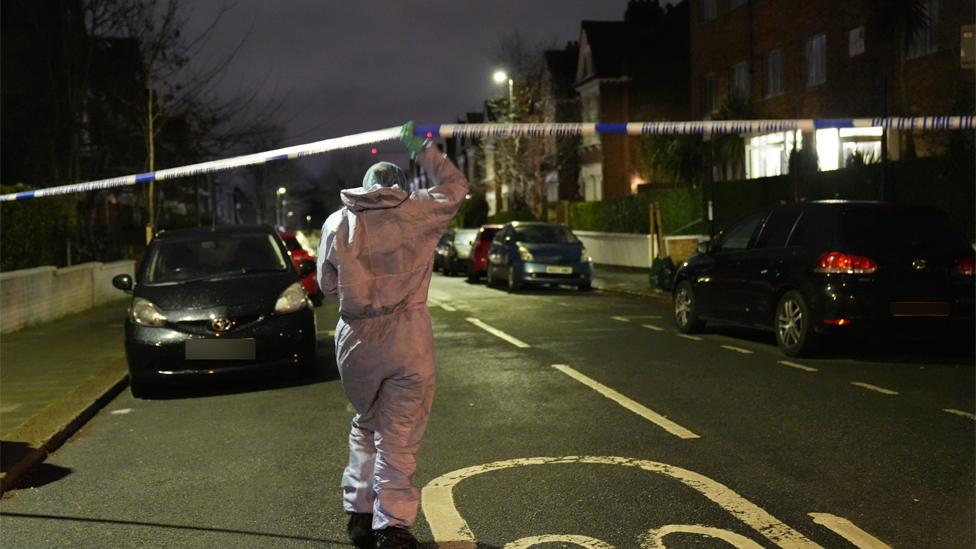Clapham attack suspect Abdul Shokoor Ezedi convicted of sex offence in 2018
- Published
Watch: The hunt to catch suspect on run after dousing woman and her two daughters with chemical
The suspect in an alkali attack in south London was convicted of a sex offence in 2018 and was later granted asylum after three attempts.
Police are looking for Abdul Shokoor Ezedi, 35, who was last seen in north London on Wednesday evening.
A mother and her three-year-old daughter hurt by the corrosive substance could have suffered "life-changing" injuries in the attack.
Police have warned people not to approach Ezedi and to instead call 999.
The 31-year-old woman and her daughter remain in hospital, along with her older daughter, eight.
Five police officers were injured as they responded, as were four members of the public who tried to help.
The attack took place near Clapham Common at about 19:25 on Wednesday.
The suspect attempted to escape the scene in a car but crashed into a stationary vehicle, then ran.
One witness described seeing the suspect lift a young child over his head and throw her onto the ground like a "ragdoll", telling the BBC the incident was like a "horror movie".
A community worker who knows Ezedi has appealed for him to give himself up, and to get medical help for his injuries.
Azad, who helps refugees in Newcastle where Ezedi lives, described the 35-year-old as polite and respectful.
In 2018, Ezedi was convicted of one charge of sexual assault and one of exposure, before being granted asylum in 2020.
He received a nine-week jail term suspended for two years for the sexual assault and, for the exposure, 36 weeks' imprisonment to be served consecutively, also suspended for two years.
The Met Police earlier issued an image of him showing facial injuries.
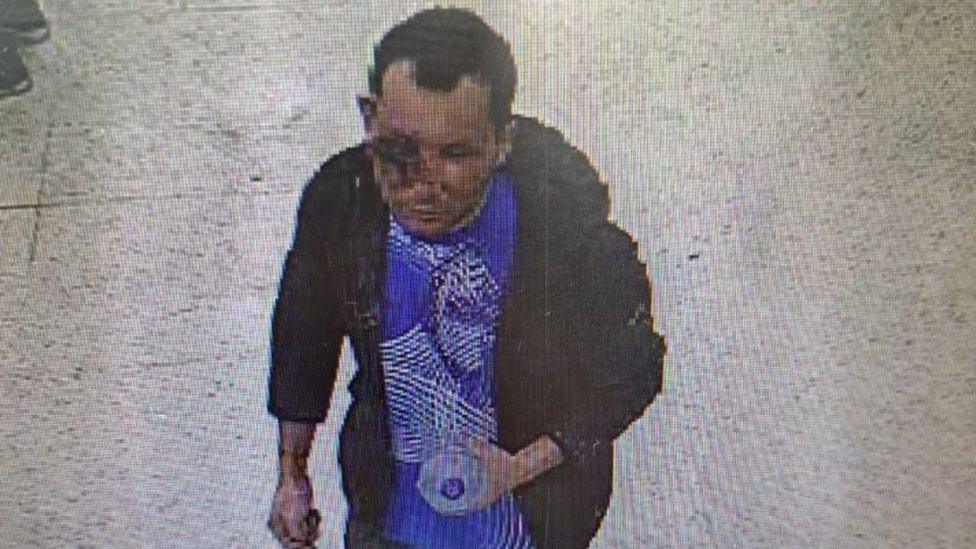
This image, captured about 70 minutes after the attack, shows the suspect at a Tesco Express in north London
It was taken at a Tesco Express shop on Caledonian Road, north London, at 20:48 GMT on Wednesday - about 5.4 miles (8.7 km) away from the alkali attack on Lessar Avenue in Clapham.
BBC News understands that Ezedi arrived in the UK by lorry in 2016, having travelled from Afghanistan.
His suspended prison sentence for the sexual offence, passed down at Newcastle Crown Court, included an unpaid work order.
Once that was complete in 2020, Ezedi was discharged from probation supervision.
Ezedi made his first unsuccessful asylum application in 2016. He later tried a second time and said he had converted to Christianity, meaning he would have been at risk if he returned to Afghanistan.
After this second claim was refused, he appealed against the decision and a tribunal overturned it in 2020, having heard from a church witness who said he believed that Ezedi had converted to Christianity.
This case is being pointed out by some in the Home Office as an example of the frustration they have with the asylum tribunal system, that people are granted asylum despite having convictions in the UK.
Current rules mean anyone sentenced to more than two years in prison is not eligible for asylum. In 2022, this was decreased to one year.
However, those who work with asylum seekers point out you can still be at risk in your home country - and therefore a genuine refugee - even if you have a conviction in the UK.
Prime Minister Rishi Sunak's official spokesman declined to comment on the suspect's immigration status during a live police investigation.
But he told reporters that, more broadly, "the PM doesn't think that foreign criminals should be able to stay in the country, putting the public at risk".
Police believe Ezedi is known to the family, but said they were not yet clear on their exact relationship.
At a news conference, Supt Gabriel Cameron said he had "no idea" what Ezedi's motivation may have been, but that he was "wholeheartedly confident" he would be caught.
He said Ezedi is believed to be from the Newcastle area, and the car left at the scene, a Hyundai, belonged to him.
Supt Cameron said the suspect was last seen in Caledonian Road.

There was a heightened police presence in that area - close to London's King's Cross station - on Thursday afternoon, including unmarked cars with blue lights, and police vans.
Twelve people in total were hurt in the attack, including five police officers who attended the scene. Out of four members of the public who tried to help, three went to hospital with injuries - two women in their 30s and one in her 50s.
Police say they "bravely came to the aid of the family" and have now been discharged from hospital.
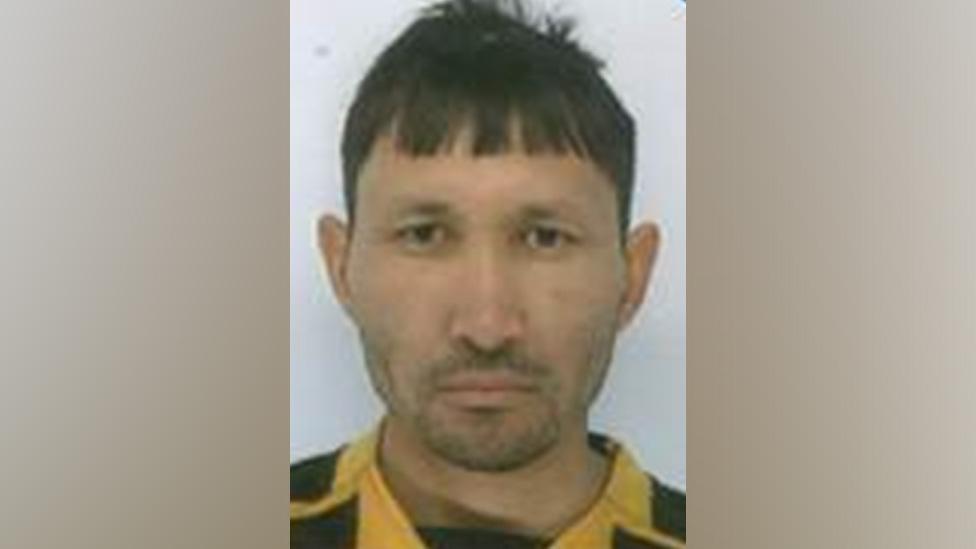
Abdul Shakoor Ezedi, 35, was last seen in Caledonian Road, north London, and police have warned the public not to approach him.
The London Ambulance Service said it sent three ambulance crews to the scene after receiving a call about an incident near Clapham Common just before 19:30.
A man in his 50s declined medical treatment for minor injuries. Five officers who were injured as they responded to the attack have left hospital after receiving treatment.
Some of the burns the mother and her daughters suffered in the attack were "quite substantial", Met Police chief Sir Mark Rowley told BBC Radio London.
One witness earlier said the mother cried "I can't see, I can't see" as he tried to help.
Police have urged any members of the public who saw what happened to call 101 quoting reference CAD 7790/31Jan.
Officers have also asked local residents and drivers to check their doorbell and dash cameras for any footage that might have captured a man fleeing the area.
The MP for the area in which the attack took place, Labour's Bell Ribeiro-Addy, said the incident had been "absolutely awful" for local people, and was a symptom of a society that "normalises violence against women and girls".
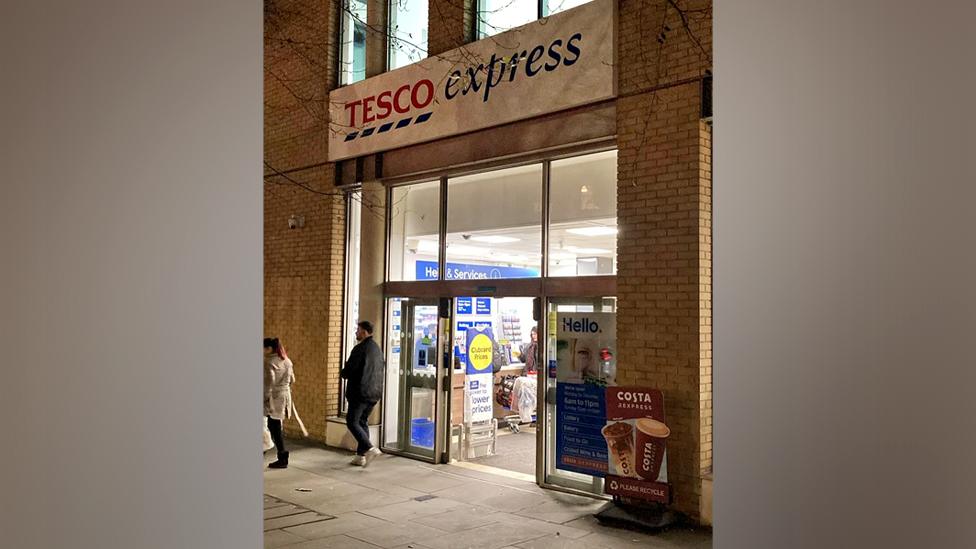
Mr Ezedi was last seen at this Tesco store on Caledonian Road, north London, at 20:48 on Wednesday
The former chief constable of Northumbria Police, who organised the manhunt for murderer Raoul Moat in July 2010, explained the involvement of multiple police forces from across the country.
Sue Sim told BBC Radio 5 Live: "I had over 23 different forces working with me up in Northumbria. When British policing works together, there is nothing better than that for catching criminality.
"British Transport Police (BTP) will be involved, Northumbria Police... because that is where he [Ezedi] is known to live.
"There will be information sent around to all forces with officers being urged on their daily briefings to keep an eye open for this man.
"Officers will be trawling through all the CCTV in any of the stations, in the area; checking up on any relatives and friends and making sure they track this man.
"The Met will make sure he is caught and put before the courts."
Former immigration minister Robert Jenrick said it was "not a great surprise" to hear that Ezedi had been granted asylum after claiming to have converted to Christianity.
He said there were often cases of asylum applicants presenting as Christian converts, "aided and abetted by often well-meaning but naïve vicars and priests".
Related topics
- Published4 February 2024
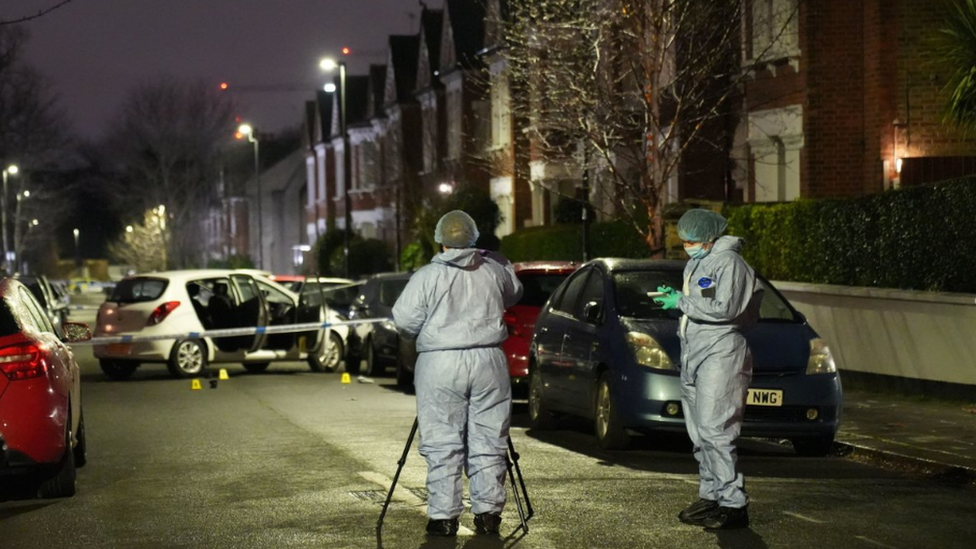
- Published1 February 2024
